Depression: It Affects Way More than Our Mental Health!
I’m struggling with depression right now, and I’m wondering if any of our Cook’n readers are as well? The interruption to our routine and lifestyle, plus the stress that this pandemic has imposed on us, is said by some medical experts to be at the bottom of it.

So maybe we should talk. First, depression doesn’t just affect us mentally and emotionally. It hits us physically as well. Loads of research proves this.
There are some specific physical symptoms to watch for. But that said, you don’t want to assume that these symptoms alone (which can also be attributed to many other things) mean you’re depressed. BUT, if they go along with LINGERING feelings of unhappiness, hopelessness, and suicidal thoughts, that could mean they’re part of depression.
And speaking of suicide (we should sometimes), please remember that if you’re experiencing suicidal thoughts, help is always available. The National Suicide Prevention Lifeline is available 24 hours a day, so don’t hesitate to call: 1-800-273-8255. If you prefer to text, reach the Crisis Text Line by texting “HOME” to 741-741.
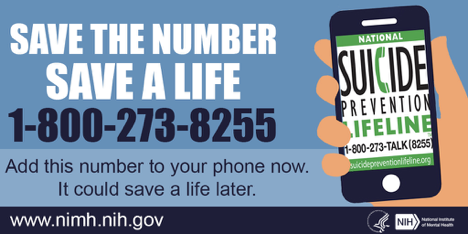
OK, now these physical symptoms: Whether mild, severe (or anything in-between), here’s exactly how depression affects your body — and what you can do about it (as taken from several well-researched sites, including www.greatist.com):
HEADACHES. Tension headaches bring a mild to moderate throbbing sensation around your eyebrows or the middle of your head, or even in your neck. Migraines will happen suddenly, out of nowhere, and can last for a few hours or even days. Migraines can leave you extremely sensitive to light and sound, nauseous, and unable to complete basic tasks. They often happen before depression occurs.
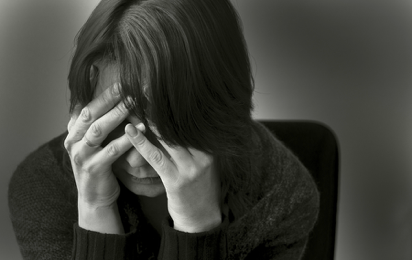
FATIGUE. Feeling some type of fatigue, whether it’s utter exhaustion (no matter how much sleep you’re getting), or a sluggish feeling (that leaves you incapable of doing much) is common. It’s an, “I can’t concentrate, focus, or enjoy anything” exhaustion.
STOMACH PAIN. There are so many reasons you could experience stomach pain that it’s easy to write it off as something completely unrelated to depression. But science says there’s a definite brain and gut connection, meaning depression (and anxiety) could be to blame for any stomach issues.

DIGESTIVE DISTRESS. Besides stomach pain, the same brain-gut connection can cause digestive issues like irritable bowel syndrome (IBS), chronic constipation or diarrhea. And digestive problems, which mess with the microbiota in your gut, can also cause depression.
BACK ACHES. Back pain or a general achy feeling that seems to arrive for no particular reason is a common physical symptom of depression. It’s an interesting circle: persistent back pain increases the risk of depression, and people who live with depression are 60% more likely to develop back pain. Studies on internal inflammation are conclusively showing that internal inflammation affects our minds and emotions, which potentially explains this link.
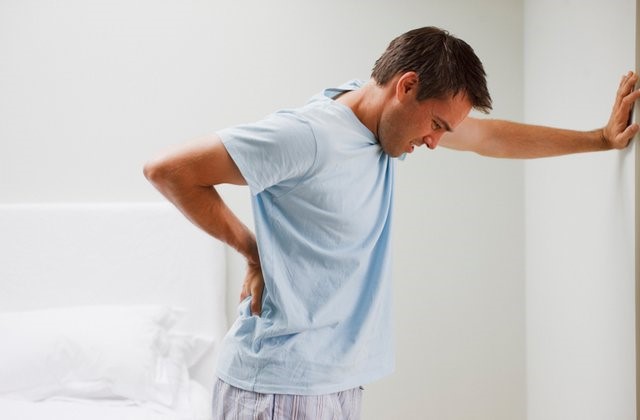
VISION ISSUES. Worsening eyesight and a tendency for everything around you to look blurry doesn’t just indicate you need glasses. It also could be your body’s way of telling you that you’re depressed.
WEAKENED IMMUNE SYSTEM. Constantly sick or unable to get rid of that cold you’ve had for the past several weeks? Consider your emotional symptoms. Depression can actually weaken your immune system, leaving you more susceptible to illness, changing the way your brain works and responds to foreign invaders (aka germs, bacteria, and viruses).
CHANGE IN WEIGHT OR APPETITE. Not the five pounds that comes and goes whenever it pleases. It’s about the significant noticeable change in weight that doesn’t result from anything different in your lifestyle. Some people experiencing depression find food unappetizing, so they lose weight from not eating. Others may eat more than normal (aka emotional eating) causing weight gain. And then there’s depression-related eating disorders (anorexia nervosa and bulimia). Research shows a concrete connection between weight and our mental state.
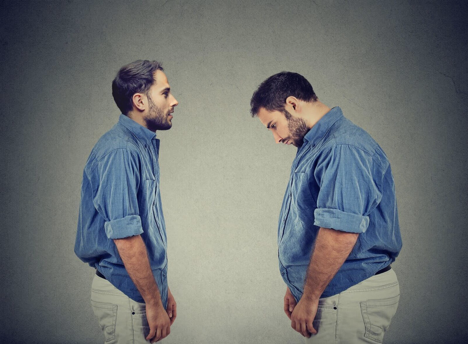
SLEEP PROBLEMS. Some people with depression want to sleep all the time, even if it doesn’t leave them feeling rested. Others may find it difficult to sleep at all, no matter the time of night or day.
DECREASED PAIN TOLERANCE. Every little thing hurts more than it should — and, unfortunately, that’s normal. Research shows an upset in mental health creates upset in ability to handle physical pain.
And there are other depression-related symptoms, such as anxiety disorder, with its rapid breathing or shortness of breath, increased heart rate, sweating, trembling or shaking, or SAD (seasonal affective disorder).
While the above information might be alarming, the good news is, there are things we can do to help with depression. Start with some daily exercise such as walking. Then clean up your diet by (this list won’t surprise you):
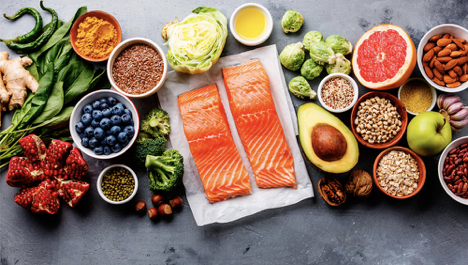
I could also suggest connecting with spirit-lifting friends and family. But as we know, the pandemic guidelines are limiting social interaction right now. And maybe more to the point, when we’re depressed, we don’t really want social interaction. In fact, one way to know you’re coming out of it is whether or not you’re interested in being with others. So that said, walking and eating well…we can start here.

Blessings upon you all at this time…especially to those who might be struggling with depression!

So maybe we should talk. First, depression doesn’t just affect us mentally and emotionally. It hits us physically as well. Loads of research proves this.
There are some specific physical symptoms to watch for. But that said, you don’t want to assume that these symptoms alone (which can also be attributed to many other things) mean you’re depressed. BUT, if they go along with LINGERING feelings of unhappiness, hopelessness, and suicidal thoughts, that could mean they’re part of depression.
And speaking of suicide (we should sometimes), please remember that if you’re experiencing suicidal thoughts, help is always available. The National Suicide Prevention Lifeline is available 24 hours a day, so don’t hesitate to call: 1-800-273-8255. If you prefer to text, reach the Crisis Text Line by texting “HOME” to 741-741.

OK, now these physical symptoms: Whether mild, severe (or anything in-between), here’s exactly how depression affects your body — and what you can do about it (as taken from several well-researched sites, including www.greatist.com):
HEADACHES. Tension headaches bring a mild to moderate throbbing sensation around your eyebrows or the middle of your head, or even in your neck. Migraines will happen suddenly, out of nowhere, and can last for a few hours or even days. Migraines can leave you extremely sensitive to light and sound, nauseous, and unable to complete basic tasks. They often happen before depression occurs.

FATIGUE. Feeling some type of fatigue, whether it’s utter exhaustion (no matter how much sleep you’re getting), or a sluggish feeling (that leaves you incapable of doing much) is common. It’s an, “I can’t concentrate, focus, or enjoy anything” exhaustion.
STOMACH PAIN. There are so many reasons you could experience stomach pain that it’s easy to write it off as something completely unrelated to depression. But science says there’s a definite brain and gut connection, meaning depression (and anxiety) could be to blame for any stomach issues.

DIGESTIVE DISTRESS. Besides stomach pain, the same brain-gut connection can cause digestive issues like irritable bowel syndrome (IBS), chronic constipation or diarrhea. And digestive problems, which mess with the microbiota in your gut, can also cause depression.
BACK ACHES. Back pain or a general achy feeling that seems to arrive for no particular reason is a common physical symptom of depression. It’s an interesting circle: persistent back pain increases the risk of depression, and people who live with depression are 60% more likely to develop back pain. Studies on internal inflammation are conclusively showing that internal inflammation affects our minds and emotions, which potentially explains this link.

VISION ISSUES. Worsening eyesight and a tendency for everything around you to look blurry doesn’t just indicate you need glasses. It also could be your body’s way of telling you that you’re depressed.
WEAKENED IMMUNE SYSTEM. Constantly sick or unable to get rid of that cold you’ve had for the past several weeks? Consider your emotional symptoms. Depression can actually weaken your immune system, leaving you more susceptible to illness, changing the way your brain works and responds to foreign invaders (aka germs, bacteria, and viruses).
CHANGE IN WEIGHT OR APPETITE. Not the five pounds that comes and goes whenever it pleases. It’s about the significant noticeable change in weight that doesn’t result from anything different in your lifestyle. Some people experiencing depression find food unappetizing, so they lose weight from not eating. Others may eat more than normal (aka emotional eating) causing weight gain. And then there’s depression-related eating disorders (anorexia nervosa and bulimia). Research shows a concrete connection between weight and our mental state.

SLEEP PROBLEMS. Some people with depression want to sleep all the time, even if it doesn’t leave them feeling rested. Others may find it difficult to sleep at all, no matter the time of night or day.
DECREASED PAIN TOLERANCE. Every little thing hurts more than it should — and, unfortunately, that’s normal. Research shows an upset in mental health creates upset in ability to handle physical pain.
And there are other depression-related symptoms, such as anxiety disorder, with its rapid breathing or shortness of breath, increased heart rate, sweating, trembling or shaking, or SAD (seasonal affective disorder).
While the above information might be alarming, the good news is, there are things we can do to help with depression. Start with some daily exercise such as walking. Then clean up your diet by (this list won’t surprise you):
- AVOIDING sugar and processed foods
- Eating whole foods, especially more fresh fruits and vegetables
- Eating a diet HIGH in anti-oxidants (Beta-carotene: apricots, broccoli, cantaloupe, carrots, collards, peaches, pumpkin, spinach, sweet potato; Vitamin C: blueberries, broccoli, grapefruit, kiwi, oranges, peppers, potatoes, strawberries, tomato; Vitamin E: nuts, seeds, wheat germ; folate; B vitamins)
- Eating “smart carbs” (whole grains and legumes)
- Eating “clarity-boosting” protein (tuna, chicken, turkey)


I could also suggest connecting with spirit-lifting friends and family. But as we know, the pandemic guidelines are limiting social interaction right now. And maybe more to the point, when we’re depressed, we don’t really want social interaction. In fact, one way to know you’re coming out of it is whether or not you’re interested in being with others. So that said, walking and eating well…we can start here.

Blessings upon you all at this time…especially to those who might be struggling with depression!
Sources:
- www.health.harvard.edu
- www.nimh.nih.gov.
- www.rtor.org
- www.hopkinsmedicine.org
- www.health.usnews.com
- www.neuroscientia.com
- www.mindful.sodexo.com
- www.myjewishlearning.com
 Alice Osborne
Alice Osborne
Weekly Newsletter Contributor since 2006
Email the author! alice@dvo.com
